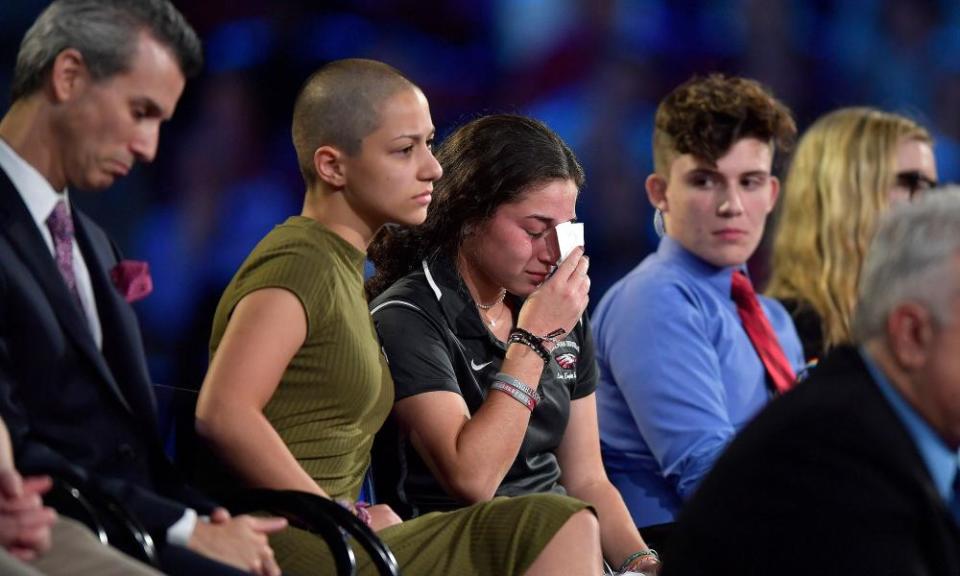Majority of poll respondents say Florida students 'effective advocates for gun control'
Monmouth University poll also shows some respondents believe students pushing for gun reform are ‘being manipulated by outside groups’

Nearly half of respondents in a new poll believe the Florida students advocating publicly for gun control reform are “being manipulated by outside groups” – at least in part.
But in findings that underline the divisions over the issue, the poll showed that seven in 10 respondents said they had seen the students on television, and six in 10 thought they were “effective advocates for gun control”.
After they survived a shooting at their high school on 14 February, in which 17 people were killed, many teenagers from Marjory Stoneman Douglas high school in Parkland spoke in favor of stricter gun control laws and began to organize a march on Washington to demand action from Congress.
Some who gave particularly passionate public speeches, including Emma Gonzalez and David Hogg, have become nationally recognized advocates, with hundreds of thousands of followers on Twitter.
A majority of respondents in the Monmouth University poll of 800 American adults said they believed the Parkland students were having more impact on the gun debate than victims of previous mass shootings.
But nearly a quarter of respondents in a new Monmouth University poll of 800 American adults said they believed this activism was “being manipulated by outside groups”. The feeling was strongest among self-identified members of the NRA, 61% of whom said they believed the students were being manipulated.
Forty-seven percents of respondents said the students, by contrast, were “advocating for issues they really believe in”. Another 27% said the students’ activism was shaped by both their own beliefs and outside manipulation. Five percent didn’t know.
It’s not (just) about the money. In 2017, the NRA spent at least $4.1m on lobbying – more than the $3.1m it spent in all of 2016. But for comparison, the dairy industry has spent $4.4m in the same period, according to the Center for Responsive Politics (CRP). The National Association of Realtors, one of the biggest spenders, has paid out $32.2m lobbying on housing issues.
The NRA has plenty of cash to spend. It bet big on the 2016 US elections, pouring $14.4m into supporting 44 candidates who won and $34.4m opposing 19 candidates who lost, according to CRP.
But “the real source of its power, I believe, comes from voters,” said Adam Winkler, a UCLA professor of constitutional law.
The 145-year-old organization claims 5 million active members, that number is disputed, but whatever its actual size, membership is a powerful tool, said Robert Spitzer, a professor at the State University of New York at Cortland.
“They have a very powerful ability to mobilize a grassroots support and to engage in politics when most Americans can barely be bothered to vote,” he said. “And because so few Americans do those things, if you get a bunch of people in a locality who are all prepared to go out to a meeting they can have a big effect." Read more
The Parkland students’ activism is, however, reaching the broader public – and many Americans are convinced they are making a difference.
The students have used interviews and their own social media platforms to attack the NRA, make arguments for gun control and respond to critics who argue that their advocacy is inappropriate.
Their responses – raw, angry, sarcastic and filled with impatience towards adults – are a striking new note in gun politics. Advocates who have often spoken on behalf of children now find children leading the way.
Nearly two-thirds of adults surveyed said they approved of how the students were handling themselves in the media. Among self-identified gun owners, 53% said they approved.
Even self-identified NRA members were not entirely negative, with only 50% saying they disapproved of how the students were handling themselves.

